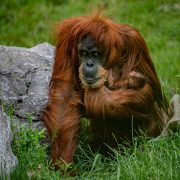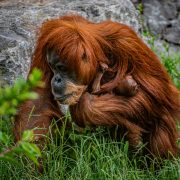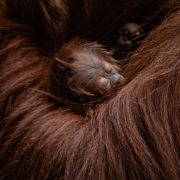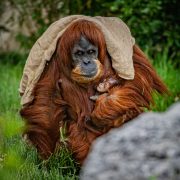One of the world’s most endangered primates has been born at the zoo!
The precious youngster – a critically endangered Sumatran orangutan – has arrived to mum Emma (34), following an eight and a half month pregnancy. Dad Puluh is also aged 34.
Primate experts at the zoo say they are yet to determine the sex of the tiny newcomer, who has been clinging tightly to mum since entering the world on Saturday (19 June).
The birth is being celebrated by conservationists around the world, including in the species’ native to South East Asia, where fewer than 14,000 of the great apes remain in the wild. Sumatran orangutans are listed as critically endangered by the International Union for the Conservation of Nature (IUCN) and face an extremely high risk of extinction.
The baby is the first of its kind to be born at the zoo since our family of Sumatran orangutans moved back to their ‘Monsoon Forest’ home. We’re currently the only zoo in mainland Britain which cares for Sumatran orangutans.
PSSSTT
“Sumatran orangutans are one of the world’s most threatened large mammals and so the safe arrival of a new baby is an incredibly special moment. Emma is an experienced mum and already she’s formed a really close bond with the little one – it’s wonderful to see her cradling it so gently.”
Claire Parry, Primate Keeper
“The youngster is a vital boost to the international conservation breeding programme, which is working to ensure a safety-net population for these critically endangered animals within the world’s most progressive zoos. Crucially, we also hope the baby will help us to raise more awareness about the destruction of rainforests in South East Asia that is driving this magnificent species, and many others, towards extinction.”
The Sumatran orangutan is one of the world’s most endangered great apes; threatened by hunting, illegal logging and habitat loss as its rainforest home is cleared to make way for palm oil plantations.
Palm oil is a highly efficient oil that is found in more than 50% of supermarket products globally. As the demand for unsustainable palm oil intensifies, orangutans are increasingly being edged towards extinction.
A team of conservationists at the Zoo are working in Indonesia, alongside sustainable palm oil farms and NGOs, to help prevent further deforestation.
PSSSTT
“For many years now our teams at the zoo have been working with palm oil suppliers in the UK, and with partners and NGOs in Indonesia, to encourage the growing of sustainable palm oil. We want there to be no further deforestation and, where palm oil plantations do already exist, we want them to include wildlife safe corridors to allow animals to move through them freely.”
Nick Davis, Deputy Curator of Mammals
“With the help of our partners, we have also started to reconnect areas of rainforest by replanting native trees back into the ground where they once stood. With palm oil being such a widely used product, people power is key in turning the tide if we’re to save these charismatic animals. Like most of the products we buy, if consumers demand certified sustainable alternatives, then suppliers will quickly change their ways and practices – bringing an end to the destruction some of the most treasured ecosystems on the planet.”
The city of Chester became the world’s first Sustainable Palm Oil City after conservationists at the zoo completely revamped the supply chains of businesses in the area to only include palm oil from sustainable, deforestation-free suppliers. This included local restaurants, cafes, hotels, fast food outlets, schools and workplaces. The project is now being used a blueprint in other communities in the UK in a bid to save South East Asia’s most precious wildlife.
THE PROBLEM WITH PALM OIL
Unsustainable palm oil plantations are wiping out incredible species due to their destructive methods which has resulted in years of deforestation. We’re fighting to prevent the extinction of precious biodiversity in South East Asia, but we need your help.
SAVING RAINFORESTS AND ORANGUTANS
We’ve been working with partners in the field, lobbying in government and educating people far and wide about the threats facing Borneo and Sumatra’s biodiversity. Our multi-faceted approach to conservation is at the heart of our conservation work around the world and especially in South East Asia.
Because ACT FOR WILDLIFE is supported by Chester Zoo, 100% OF YOUR DONATIONS go straight to OUR CONSERVATION WORK! That’s pretty special. We couldn’t PREVENT EXTINCTION without YOU!



